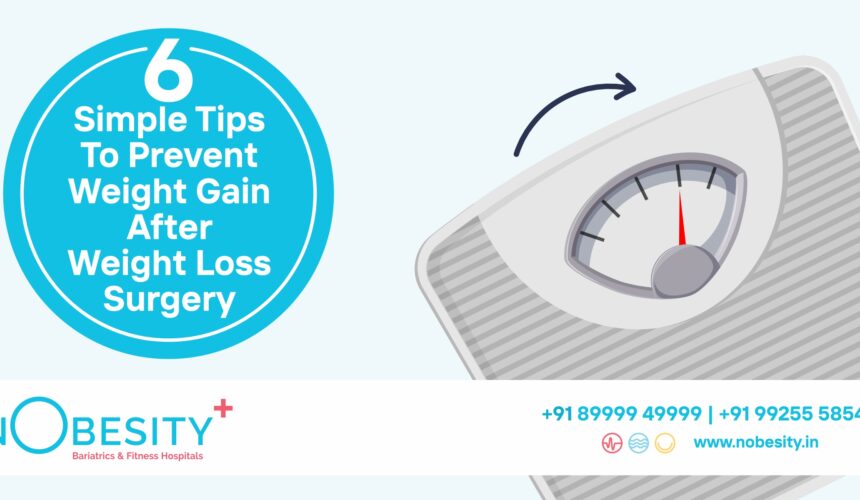
Obesity is one of the fastest-growing health issues or diseases worldwide among all age groups. It has increased to a whopping three times since 1980 throughout the world. Increased consumption of energy-dense processed foods that are high in fat and sugar, along with an increase in physical inactivity due to changing modes of work and transportation during the past few decades, is a major reason for the increase in obesity worldwide.
In this modern world, the simplest and easiest way to achieve weight loss is through a surgery known as Bariatric surgery. Weight loss achieved by only a dietary plan is usually short-term and reversible, while surgical weight loss offers long-term weight loss, improved coexisting diseases, the better quality of life, and improved self-esteem. This surgery alters the gut hormone levels that are responsible for hunger which further leads to a new hormonal weight set point.
Although, however simple this process may feel, it is not a spell that would magically help someone achieve weight loss. This is a long-term process and a significant amount of weight loss is achieved only after a certain period of time which depends on the type of surgery performed and other medical conditions of the patient. As this is a long-term process, certain precautions have to be taken, and nutritional guidelines must be followed in order to achieve effective weight loss. This requires a strong will and a change in the current lifestyle of the patient.
Hence, here are some tips to prevent weight gain post-surgery
Strictly follow the diet plan suggested by your health advisor:
The simplest tip to prevent weight gain is to follow the diet plan suggested by the expert. After completion of the surgery, only liquid diets, including sugar-free drinks and fruit juices, should be consumed. This diet is to be followed strictly until the recovery of the gastrointestinal tract is nearly complete. For the next 2-4 weeks, consumption of partly solid (soft) but mainly liquid diet is emphasized. However, some people slip back to their old habits of fat-rich food. Stay on track, stay committed and keep reminding yourself about why in the first place, you decided to get this surgery done.
Know your limits
Don’t go on having the same amount of food you used to. Overeating causes nausea and vomiting because the size of the stomach is reduced during the surgery. The next tip is to have control over the amount of food consumed. A body that weighs more requires more amount of calories for fulfilling its needs. But once the surgery is performed, the same amount of food intake will result in less weight loss, weight gain after surgery if not taken care of. Remember, weight loss also helps tackle diseases related to obesity; regaining weight would also increase the risks of cardiovascular/heart diseases, diabetes, etc.
Exercise
Start exercising regularly. The first step towards a healthy body starts with exercising. Start off with walking a distance you feel comfortable with and then start increasing the distance gradually with each passing week and after that, start working on speed. Try to reach a goal of 250 plus minutes of exercise a week. Fitness is an essential part of life; everyone should make it a priority. To be honest, a person should always be committed to fitness. Staying in shape has unlimited advantages, hypothetically. In fact, this process should start even before the surgery. Once you make up your mind about the surgery, don’t wait for it. Apart from this, a good night’s sleep also plays an important role because insufficient sleep has a bad effect on overall health.
Quality of food
Start having more protein and vitamin-rich diets. Avoid consuming lipids and carbohydrates rich food. Around 70 grams of protein intake is required for a healthy body throughout the day. This will help keep your energy up while keeping the number of calories consumed under control. Consumption of sugar must be limited. Thus, a patient will need to avoid consuming food such as fried foods, puddings, chips, ice cream, cakes, milkshakes, etc. Generally, foods containing a high amount of fats or sugar, or calories must be avoided. Eating quality food also helps regain muscle strength. Increased muscle strength helps improve work rate as well as work efficiency while helping a person deal with more amount of work than usual.
Eating habits
Develop good eating habits, eat three times a day and stop snacking. Along with consuming protein-rich diets and a small amount of food, how many times you eat also affects the result of the surgery. If you go around having bites all day long, eventually it will result in more amount of calorie intake and hence further increasing the chances of weight gain. Chaotic eating, skipping meals, eating small portions of food over an extended period of time, eating at night, eating beyond fullness, alcohol intake are some things to be strictly avoided after surgery. Thus eating only 3/4 times a day will help a lot in maintaining weight. This should be converted into a habit and should be thoroughly followed. Eating slowly should also be implemented for a better digestive system. As the size of the stomach is reduced during the surgery, time is taken to digest food also increases.
Medications
After weight loss surgery, some people have to take multivitamin pills in order to fulfill the vitamins and minerals necessary for the body. Medicines should only be taken as and when prescribed by an expert. Taking unnecessary or excess amounts of medicines may also cause further health issues.
Despite knowing all these tips, after all, we are human beings, and we tend to make mistakes. Sometimes we are just lazy, and sometimes, we lose track of things and slip up. In such a case, just remember the promise you made to yourself when you started and seek help from a professional. Ignoring or shying away from a situation is not a solution. For instance, if you are having an issue with diet food/plan, take professional advice from a dietician at NObesity before making any changes.


